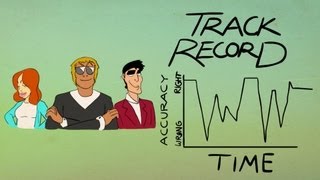(单词翻译:单击)
You believe that the Sun is much larger than the Earth,
你相信太阳要比地球大很多,
that the Earth is a roughly spherical planet that rotates on its axis every 24 hours
地球是一个接近于球体的星球,每24小时自转一周,
and it revolves around the Sun once every 365 days.
每365天绕着太阳转一周。
You believe that you were born on a particular date,
你相信你是在某个特定的时间出生的,
that you were born to two human parents and that each of your human parents was born on an earlier date.
你有父亲和母亲,并且你还相信你的父母都比你更早出生。
You believe that other human beings have thoughts and feelings like you do and that you are not surrounded by humanoid robots.
你相信其他的人类也像你一样有思想和感觉,你不是被类似于人类的机器人所环绕。
You believe all of these things and many more, not on the basis of direct observation,
你相信所有这些以及更多的事情,虽然你没有亲眼所见,
which can't, by itself, tell you very much about the relative size and motion of the Sun and the Earth,
因为,观察事物的本身,并不能告诉你很多关于家族大小、太阳与地球的活动
or about your own family history, or about what goes on in the minds of other humans.
或者你的家族历史、或是别人的大脑里在想什么。
Instead, these beliefs are mostly based on what you've been told.
相反,大部分的这些知识都是别人告诉你的。
Without spoken and written testimonies, human beings could not pass on knowledge from one person to another, let alone from one generation to another.
没有笔头或者口头证据,人类不能在人和人之间传递知识,更不必说一代和一代之间了。
We would know much, much less about the world around us.
我们对身边的世界会了解得更少。
So learning about a topic by asking an expert on that topic, or appealing to authority, helps us gain knowledge, but, it doesn't always.
所以通过询问一位专家或是相信权威来学习一个主题,可以帮助我们增长知识,然而,这也不尽然。
Even the most highly respected authorities can turn out to be wrong.
即使是最德高望重的权威也有可能出错。
Occasionally this happens because a highly respected authority is dishonest
这偶尔会发生,因为德高望重的权威可能说谎,
and claims to know something that she or he really doesn't know.
并声称他知道某件他明明不知道的事。
Sometimes it happens just because they make a mistake.
有时候仅仅是因为他们犯错了。
They think they know when they don't know.
他们认为他们知道,但事实却不是这样。
For example, a number of respected economists did not expect the financial collapse of 2008.
举例来说,许多知名的经济学家并没有预测到2008年的金融危机。
They turned out to be wrong. Maybe they were wrong because they were overlooking some important evidence.
他们错了。这错误可能源自他们忽略了一些重要的证据。
Maybe they were wrong because they were misinterpreting some of the evidence they had noticed.
也可能源自他们对证据的错误解读。
Or maybe they were wrong simply because they were reasoning carelessly from the total body of their evidence.
又或者仅仅只是因为他们从完整的证据做出草率的推论。

But whatever the reason, they turned out to be wrong and many people who trusted their authority ended up losing lots of money,
但不管理由是什么,他们就是错了,而且许多相信他们的人最后损失了许多钱,
losing lots of other people's money, on account of that misplaced trust.
也损失许多其它人的钱,都是因为错误的信任。
So while appealing to authority can sometimes provide us with valuable knowledge, it also can sometimes be the cause of monumental errors.
所以当相信权威可以提供我们有用的知识的同时,它也有可能造成严重的错误。
It's important to all of us to be able to distinguish those occasions
我们每个人都应该有能力辨别出,
on which we can safely and reasonably trust authority from those occasions on which we can't.
在什么情况下我们可以合理地相信权威,哪些情况下却不行。
But how do we do that? In order to do that,
但我们如何分辨呢?在这个状况下,
nothing is more useful than an authority's track record on a particular topic.
没有什么比权威在某专业的历史纪录更为重要了。
If someone turns out to perform well in a given situation much of the time,
如果某人在某一既定情境下总是表现得很好,
then it's likely that he or she will continue to perform well in that same situation, at least in the near term.
那么他就很可能在同样情境下一样表现得不错,至少就短期来说是这样的。
And this generalization holds true of the testimony of authorities as much as of anything else.
而这个推论对不同领域、不同权威的说法也是正确的。
If someone can consistently pick winners in both politics and baseball,
如果有人持续地在政治及棒球上选对胜利者,
then we should probably trust him or her to keep on picking winners in both politics or baseball,
那么我们也许可以相信他会继续在这两样上预测正确,
though maybe not in other things where his or her track record may be less stellar.
但纪录不好的其它领域,我们可能就没办法如此推测。
If other forecasters have a poorer track record on those same two topics, then we shouldn't trust them as much.
如果其他预测员在这两方面的纪录更为不良,那么我们也不该那么相信他。
So whenever you're considering whether to trust the testimony of some authority,
所以每一次你在决定要不要相信某权威时,
the first question to ask yourself is, "What's their track record on this topic?"
第一个要问自己的就是:“他在这专业上过去的纪录如何?”
And notice that you can apply the very same lesson to yourself.
值得注意的是,你可以将这件事用在自己身上。
Your instincts tell you that you've just met Mr. Right,
你的直觉告诉你,你遇到了对的人,
but what sort of track record do your instincts have on topics like this one?
但是自己直觉在这方面的纪录是怎样的呢?
Have your instincts proven themselves to be worthy of your trust?
你的直觉有证明它们是值得相信的吗?
Just as we judge other people's testimony by their track record,
就像是我们通过纪录来判断别人的说辞,
so, too, we can judge our own instincts by their track record.
我们也可以用纪录来判断自己的直觉。
And this brings us one step closer to an objective view of ourselves and our relation to the world around us.
而这让我们更进一步了解了对我们自己的客观看法以及我们与宇宙共存的关系。


